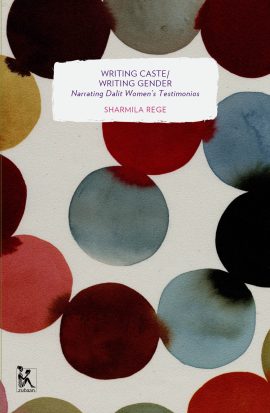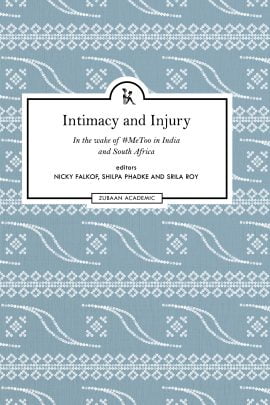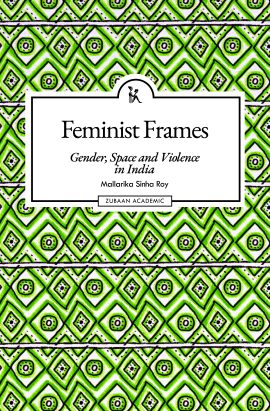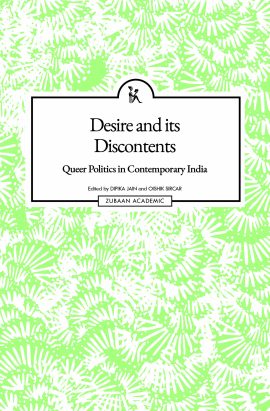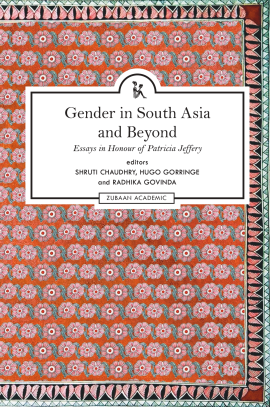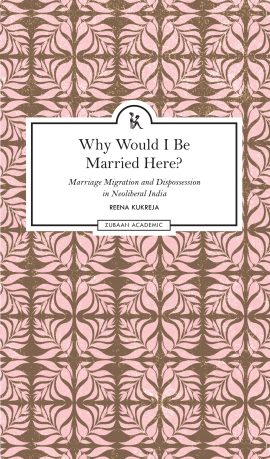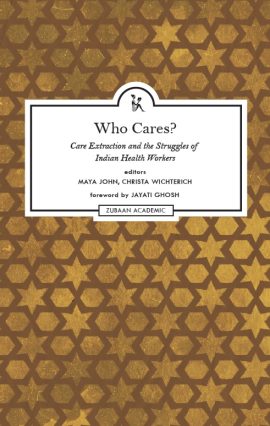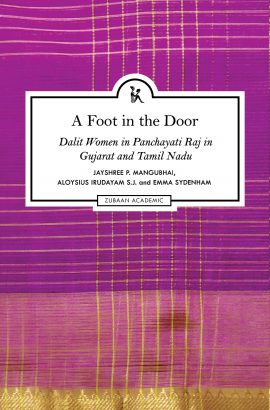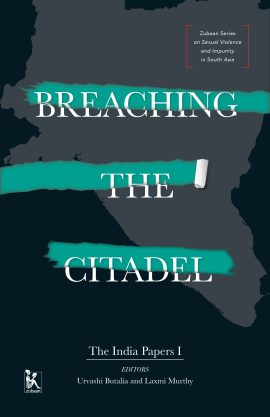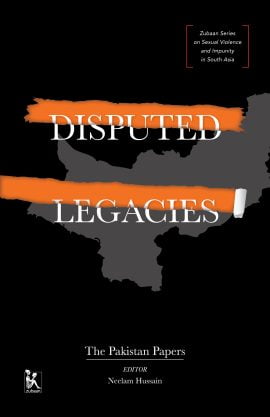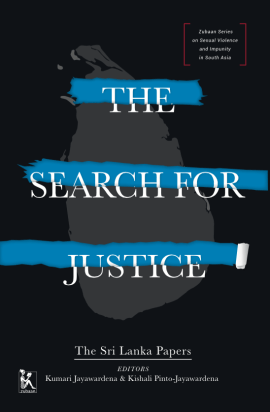No products in the cart.
Return To Shop
Log in / Sign in
Login
Register
Writing Caste/Writing Gender: Narrating Dalit Women’s Testimonios (Zubaan Classics)
From ₹ 315
This powerful counter-narrative to the mainstream assumptions about the development of feminism in India in the 20th century is now available in a brand new paperback edition as part of the Zubaan Classics series to celebrate Zubaan's 10th anniversary.The last decade saw the emergence and assertion of separate Dalitbahujan women's organizations both at the national and regional levels. Excluded from political and cultural spheres, Dalit women's movements have sought to transform both Dalit and feminist politics in India. They have fought against the reproduction of caste within modern spaces like universities, bureaucracies and within the women's movement as well as women's studies. The assumptions about caste identities being private and personal have been questioned and serious challenges posed for understanding caste and gender in contemporary India.Located within this context, this book brings together extracts from the work of Kumud Pawade, Urmila Pawar, Shantabai Kamble, Mukta Sarvagod, Shantabai Dani, Vimal More and Janabai Girhe.
SHARMILA REGE is a Professor at the Department of Sociology, University of Pune. She has worked for several years with the Krantijyoti Savitribai Phule Women?s Studies Centre, University of Pune. She has written and published on sociology of gender, Dalit feminism and Dalitbahajun public culture in Maharashtra. Her present work concerns the documentation of music and print cultures of the Ambedkarite counterpublics in contemporary Maharashtra.
Select format
This product has multiple variants. The options may be chosen on the product page "So riveting is the narration that it is difficult to put down the book until their stories are finished. For a non-fiction academic work this is no small feat." -- Anupama Katakam, The Hindu
SHARMILA REGE is a Professor at the Department of Sociology, University of Pune. She has worked for several years with the Krantijyoti Savitribai Phule Women?s Studies Centre, University of Pune. She has written and published on sociology of gender, Dalit feminism and Dalitbahajun public culture in Maharashtra. Her present work concerns the documentation of music and print cultures of the Ambedkarite counterpublics in contemporary Maharashtra.
Intimacy and Injury: In the wake of #MeToo in India and South Africa
₹ 975
This book, a timely mapping of a shifting political field around gender-based violence in the global south, brings together academics and activists from South Africa and India who explore not only the disturbing prevalence of high levels of sexual violence but also the long histories of resistance to it. Using the lens of the #MeToo movement, the authors track the histories of feminist organising in both countries, while also revealing how newer strategies both extended and limited these struggles. In proposing comparative, interdisciplinary, ethnographically rich and analytically astute reflections on #MeToo, this book points to new and potentially transformative directions to scholarly debates and transnational feminist knowledge and solidarity in and across the global south.
NICKY FALKOF is an associate professor in the Media Studies department at the University of the Witswatersrand in Johannesburg. Her books include The End of Whiteness: Satanism and Family Murder in Late Apartheid South Africa (2016), Anxious Joburg: The Inner lives of a Global South City (2020) and Worrier State: Risk, Anxiety and Moral Panic in South Africa (2022). Her research is concerned with race, anxiety and the media in the urban global south.SHILPA PHADKE is a professor at the School of Media and Cultural Studies, Tata Institute of Social Sciences, Mumbai. She is co-author of the critically acclaimed book, Why Loiter: Women and Risk on Mumbai Streets (2011), and co-director of the film, Under the Open Sky (2016). She has published both academically and in mainstream media on gender and public space, ethnographies of feminism, feminist pedagogy, risk and the city, middle-class sexualities, and the new spaces of consumption, and feminist parenting. She is currently editing an anthology on friendship and its possibilities in South Asia.SRILA ROY is professor of Sociology and Head of Development Studies at the University of Witswatersrand, South Africa. She is author of Remembering Revolution: Gender, Violence and Subjectivity in India’s Naxalbari Movement (2012), editor of New South Asian Feminisms (2012), and co-editor of New Subaltern Politics: Reconceptualising Hegemony and Resistance in Contemporary India (2015). Her book on queer feminist politics in liberalized India is forthcoming. At Wits, she leads the Governing Intimacies project, which promotes new scholarship on gender and sexuality in South Asia and India, with support from the Andrew W. Mellon Foundation.
Add to cart
NICKY FALKOF is an associate professor in the Media Studies department at the University of the Witswatersrand in Johannesburg. Her books include The End of Whiteness: Satanism and Family Murder in Late Apartheid South Africa (2016), Anxious Joburg: The Inner lives of a Global South City (2020) and Worrier State: Risk, Anxiety and Moral Panic in South Africa (2022). Her research is concerned with race, anxiety and the media in the urban global south.SHILPA PHADKE is a professor at the School of Media and Cultural Studies, Tata Institute of Social Sciences, Mumbai. She is co-author of the critically acclaimed book, Why Loiter: Women and Risk on Mumbai Streets (2011), and co-director of the film, Under the Open Sky (2016). She has published both academically and in mainstream media on gender and public space, ethnographies of feminism, feminist pedagogy, risk and the city, middle-class sexualities, and the new spaces of consumption, and feminist parenting. She is currently editing an anthology on friendship and its possibilities in South Asia.SRILA ROY is professor of Sociology and Head of Development Studies at the University of Witswatersrand, South Africa. She is author of Remembering Revolution: Gender, Violence and Subjectivity in India’s Naxalbari Movement (2012), editor of New South Asian Feminisms (2012), and co-editor of New Subaltern Politics: Reconceptualising Hegemony and Resistance in Contemporary India (2015). Her book on queer feminist politics in liberalized India is forthcoming. At Wits, she leads the Governing Intimacies project, which promotes new scholarship on gender and sexuality in South Asia and India, with support from the Andrew W. Mellon Foundation.
Feminist Frames: Gender, Space and Violence in India
From ₹ 625This book revisits approaches to South Asian feminist politics through the lens of shared historical memories and their social spatialisation. The author looks at borderlands, socialist visions of internationalism, cultures of travel, theatre history, artist-activist performances, and connected histories of discrete geo-political formations. Locating the book’s spatial context in Bengal—for its long tradition of militant movements and its historical cross-border connections—Sinha Roy attempts to release the spatial into South Asian feminism and historicise the space and place of Bengal in a dynamic relationship with time. She argues that in addition to plotting a temporally progressive chronological story of gender, violence and love in the inert space of Bengal (bracketed by national and international borders), the practices of spatialisation play an active role as temporal emplotment, in organising and prioritising the major place-based arguments.
______________________________________________________________________________________MALLARIKA SINHA ROY is an assistant professor at the Centre for Women’s Studies, Jawaharlal Nehru University, New Delhi. She is a recipient of the Erasmus Fellowship, University of Cologne, and a post-doctoral fellowship from the Danish Agency for Science, Technology and Innovation. She has been co-principal investigator in the University Grants Commission project ‘Traces of the Global: Displacement, Memory, Cultural Citizenship 2014-19’ and a British Academy project, ‘Cultures of the Left’. She has many publications to her credit, including Gender and Radical Politics in India: Magic Moments of Naxalbari (1967-1975), Utpal Dutt and Political Theatre in Postcolonial India (2024), and she is co-editor with Papori Bora, Vijaya Rao and Shambhavi Prakash, of Displacement and Citizenship: Histories and Memories of Exclusion (2020). She has published in many peer-reviewed journals and has contributed chapters to various books.
Desire and Its Discontents: Queer Politics in Contemporary India
From ₹ 630Has the queer movement's politics in India escaped the combined onslaught of neoliberalism, Hindutva and brahminism? What has this triad done to queer politics in the wake of the 'reading down' of India's sodomy law? Has the decriminalization of adult, consensual and private sex, depoliticized the queer movement? Is the queer movement immune to casteist, sexist and religious prejudice? In the aftermath of the failures and triumphs in the historic Naz, Koushal, NALSA and Navtej judgements of the Supreme Court of India, the essays in this volume engage in a counterintuitive interrogation of the prejudiced dimensions of the mainstream queer movement in India. The essays offer insights into the ways in which new forms of queer solidarities, mobilizations and imaginaries are resisting and subverting the movement's tacit and overt alignments with neoliberalism, Hindutva and brahminism.
______________________________________________________________________________________
‘Too often, queer activists and scholars seeking emancipation through legal rights forget how much context matters, and how much law is committed to maintaining the very hierarchies that state power relies upon. Readers of this volume are unlikely to ever forget again. Contributors expose the exclusionary representations of queer legal subjects produced by recently celebrated judgements in the context of India, tracking myriad linkages to the right-wing, neoliberal, Hindutva agenda of the present government. Readers will emerge better equipped to continue the struggle for liberation wherever they are located.’
—Dianne Otto, Professorial Fellow, Melbourne Law School, The University of Melbourne
‘This uniquely caring anthology edited by Dipika Jain and Oishik Sircar at long last inaugurates an Indian critical queer theory, which is not a replica of the Euromerican approaches. Even as we welcome the decriminalization of gayness, we are asked to rethink beyond legal emancipation towards social emancipation—where there are very few subjects desiring neoliberalism. The struggles for a quest for queer politics constitute a response against the “violence and exclusions” of the triple enslavement constantly generated by forms, and forces of “Hindutva, neoliberalism and brahminism”. The “conditions of postmodernity” that further affect the “spectacles of emancipation” invite contemplation: how is an “embracing of the disruptive potential” of trans and gender non-binary identities, to create a “sustainable, radical politics, while simultaneously asserting the right to access state benefits?”. This book summons new futures beginning with a trans-constitutional renaissance.’
—Upendra Baxi, Emeritus Professor of Law, Universities of Warwick and Delhi
‘Dipika Jain and Oishik Sircar’s much anticipated second volume of essays extends their path-breaking original insights into the intimate entanglements of queer politics and neoliberalism. This volume too is poised to become nothing short of a classic, in bringing together some of the best-known voices on the politics of gender and sexuality. Turning their critical gaze to India, after the abrogation of Section 377, the essays offer refreshingly counter-intuitive analyses of such queer success and freedoms. In the aftermath of the decriminalization of homosexuality, the underlying nexus between Hindu nationalism, neoliberalism, casteism and queer rights has come fully to the fore. The volume provokes new ways to think of homonationalism and homocapitalism from this vantage point. Yet it is much more. From the relationship of queer to gender, caste, feminism and majoritarianism, to the transnational travel of Indian queerness to queering as a method, these remarkable interventions will singularly and together redirect our analytical and methodological impulses as well as reaffirm our political commitments to feminist queer worldmaking.’
—Srila Roy, Professor, Department of Sociology, University of the Witwatersrand
______________________________________________________________________________________DIPIKA JAIN is Professor of Law, Vice Dean (Research), Vice Dean (Clinical Legal Education), and the Director of the Centre for Justice, Law and Society at Jindal Global Law School (JGLS), India. She served as a visiting faculty member at the Transnational Law Institute at Kings College London from 2017-2020. Her research was cited by the Supreme Court in the landmark decision of Navtej Johar v. Union of India (2018). In 2018, she was designated the first Research Professor at JGLS. In 2020, her research was cited in the legislative debate on abortion laws in the Indian Parliament. She has published in several prestigious journals, law reviews, and compendia internationally, and her work can be found at https://jgls.academia.edu/DipikaJain. She has consulted for the UNDP, Centre for Reproductive Rights (New York), ARROW, and IPAS Development on Reproductive Justice, Digital Health and Family Law. As the Director of CJLS, she has addressed various barriers in access to justice for marginalized persons in India.
OISHIK SIRCAR is Professor of Law at Jindal Global Law School, and an associate member of the Institute for International Law and the Humanities, Melbourne Law School. Oishik is the author of Violent Modernities: Cultural Lives of Law in the New India (Oxford University Press, 2021) and Ways of Remembering: Law, Cinema and Collective Memory in the New India (Cambridge University Press, 2024). With Dipika Jain, Oishik has previously co-edited New Intimacies, Old Desires: Law, Culture and Queer Politics in Neoliberal Times (Zubaan, 2017). With Debolina Dutta, Oishik is the co-director of the award-winning documentary film We Are Foot Soldiers (PSBT, 2010).
Gender in South Asia And Beyond: Essays in Honour of Patricia Jeffery
From ₹ 625For over 40 years, Professor Patricia Jeffery, Professor Emerita in Sociology, University of Edinburgh, carried out pioneering research, individually and in partnership with her colleagues. The range of subjects she covered includes gender and development, especially childbearing, women’s reproductive rights, social demography in South Asia, Indian society, gender and communal politics, education and the reproduction of inequality; race and ethnicity. Her books, including Frogs in a Well: Indian Women in Purdah (1979) and Appropriating Gender: Women’s Activism, Politicized Religion and the State in South Asia (edited with Amrita Basu, 1998) inspired peers and future scholars alike. In this volume, we bring together a range of new research that is inspired by and intersects with Professor Jeffery’s work. The chapters offer new data, refreshing insights and original analysis on subjects of contemporary importance in the fields of gender, health, marginalization and development.
______________________________________________________________________________________
SHRUTI CHAUDHRY is a Chancellor’s Fellow in Sociology at the University of Edinburgh. Her doctoral research was completed at Edinburgh Sociology and was supervised by Patricia Jeffery. Her research focuses on migration, family and intimate relationships, ageing and the life course, social change, gender and intersecting inequalities explored in the context of India and the South Asian diasporas in Scotland. She is the author of Moving for Marriage: Inequalities, Intimacy and Women’s Lives in Rural North India (2021), a comparative ethnographic study of women who migrate for marriage, regionally and cross-regionally, to become brides in western Uttar Pradesh.
HUGO GORRINGE is a senior lecturer in Sociology and former co-director of the Centre for South Asian Studies at the University of Edinburgh. His first academic post was as a replacement lecturer to Patricia Jeffery. His research interests focus on Dalit movements and politics in the south Indian state of Tamil Nadu. He is the author of Untouchable Citizens (2005) and Panthers in Parliament (2017) which address the rise of the Viduthalai Chiruthaigal Katchi (VCK) and their entry into politics. He has co-edited a number of volumes including From the Margins to the Mainstream (2016, with Suryakant Waghmore and Roger Jeffery), Civility in Crisis (2020, with Suryakant Waghmore) and Caste in Everyday Life (2023, with Dhaneswar Bhoi). He has also written numerous articles on caste, violence and politics.
RADHIKA GOVINDA is a senior lecturer in Sociology at the School of Social and Political Science, University of Edinburgh and the Director of GENDER.ED – the university’s interdisciplinary hub for gender and sexualities studies. She convenes Gender and Development – a postgraduate course that Patricia Jeffery designed and convened for many years. Her research focuses on the gender politics of development, intersecting inequalities and feminist knowledge production. She has co-edited Doing Feminisms in the Academy in India and the UK (Zubaan 2021, with Fiona Mackay, Krishna Menon and Rukmini Sen). She has also published a number of articles on gender, caste, masculinities, feminist activism and development in India.
Why Would I Be Married Here: Marriage, Migration and Dispossession in Neoliberal India
₹ 895Why Would I Be Married Here? examines marriage migration undertaken by rural bachelors in North India, unable to marry locally, who travel across the breadth of India seeking brides who do not share the same caste, ethnicity, language, or customs as themselves. Combining rich ethnographic evidence with Dalit feminist and political economy frameworks, Reena Kukreja connects the macro-political violent process of neoliberalism to the micro-personal level of marriage and intimate gender relations to analyse the lived reality of this set of migrant brides in cross-region marriages among dominant-peasant caste Hindus and Meo Muslims in rural North India.
Why Would I Be Married Here? reveals how predatory capitalism links with patriarchy to dispossess many poor women from India's marginalized Dalit and Muslim communities of marriage choices in their local communities. It reveals how, within the context of the increasing spread of capitalist relations, these women's pragmatic cross-region migration for marriage needs to be reframed as an exercise of their agency that simultaneously exposes them to new forms of gender subordination and internal othering of caste discrimination and ethnocentrism in conjugal communities. Why Would I Be Married Here? offers powerful examples of how contemporary forces of neoliberalism reshape the structural oppressions compelling poor women from marginalized communities worldwide into making compromised choices about their bodies, their labour, and their lives.
REENA KUKREJA is assistant professor at Queen’s University.
Who Cares?: Care Extraction and the Struggles of Indian Health Workers
From ₹ 575
The recent global pandemic highlighted the crucial role played by (mostly female) care workers in providing health services across the world. At the same time, it exposed the deep vulnerabilities and precarities of their lives—abysmally low wages, long working hours, social prejudice, notorious undervaluation—at the hands of an uncaring and exploitative economic system. The editors of this volume identify this as ‘care extractivism’, a strategy that enables the simultaneous extraction and undervaluation of care work, something in which governments and societies are both complicit. Further, they point to the impact of liberalization and professionalization on the political economy of nursing wherein the market principle of cost efficiency leads to informalization, contract labour and hierarchization of nursing in both private and public hospitals.The contributors to this important and timely book draw attention to the varied histories of health care work in India and of Indian nurses abroad. They look also at the recent struggles through which workers have tried to improve their working conditions and which represent a silver lining as they imbibe the potential to disrupt the chain of undervaluation, cost cutting, and poor quality healthcare.
MAYA JOHN teaches history at the University of Delhi. She has been researching and publishing on the politics of epidemiology and the history of epidemics. She has also worked on the relationship between caste, gender and the labour market, the evolution of labour law in colonial and postcolonial India, gender-specific laws at the workplace, the history of educational inequality in India, and recent antirape agitations in India. John actively works with nurses’ unions in Delhi-NCR and with unions of domestic workers and teachers.CHRISTA WICHTERICH is a feminist sociologist and scholar activist. She worked as a lecturer at Gilan University in Iran and Jawaharlal Nehru University, New Delhi. She has been a foreign correspondent for German newspapers and radio stations in Nairobi, and a guest professor at the universities of Vienna, Basel and Kassel. As a journalist and author she has researched and published extensively on globalization and women’s work, feminist political economics, feminist ecology and women’s movements. During an ICAS fellowship in the winter of 2018-19 in New Delhi she did research on care extractivism with regard to scheme workers and nurses in India.
Select format
This product has multiple variants. The options may be chosen on the product page MAYA JOHN teaches history at the University of Delhi. She has been researching and publishing on the politics of epidemiology and the history of epidemics. She has also worked on the relationship between caste, gender and the labour market, the evolution of labour law in colonial and postcolonial India, gender-specific laws at the workplace, the history of educational inequality in India, and recent antirape agitations in India. John actively works with nurses’ unions in Delhi-NCR and with unions of domestic workers and teachers.CHRISTA WICHTERICH is a feminist sociologist and scholar activist. She worked as a lecturer at Gilan University in Iran and Jawaharlal Nehru University, New Delhi. She has been a foreign correspondent for German newspapers and radio stations in Nairobi, and a guest professor at the universities of Vienna, Basel and Kassel. As a journalist and author she has researched and published extensively on globalization and women’s work, feminist political economics, feminist ecology and women’s movements. During an ICAS fellowship in the winter of 2018-19 in New Delhi she did research on care extractivism with regard to scheme workers and nurses in India.
Recasting Women: Essays in Colonial History
From ₹ 315
This landmark collection on colonial history is now available in a brand new edition as part of the Zubaan Classics series to celebrate Zubaan's 10th anniversary.This collection of essays stands at an unarticulated conjuncture within the feminist movement and women's studies that have emerged in India since the 1970s. The anthology attempts to explore the inter-relation of patriarchies with political economy, law, religion and culture and to suggest a different history of 'reform' movements, and of class and gender relations. The book seeks to uncover the dialectical relation of feminism and patriarchy both in the policies of the colonial State and the politics of anticolonial movements. The writers in this volume include scholars from various disciplines.
KUMKUM SANGARI & SUDESH VAID taught literature at Indraprastha College for Women, Delhi University. Together they have edited a collection of essays entitled Women and Culture and have carried out extensive research on widow immolation in Rajasthan.
Select format
This product has multiple variants. The options may be chosen on the product page KUMKUM SANGARI & SUDESH VAID taught literature at Indraprastha College for Women, Delhi University. Together they have edited a collection of essays entitled Women and Culture and have carried out extensive research on widow immolation in Rajasthan.
A Foot in the Door: Dalit Women in Panchayati Raj in Gujarat and Tamil Nadu
From ₹ 425
A Foot in the Door is the culmination of research undertaken in the rural panchayats of Gujarat and Tamil Nadu, and brings the voices of Dalit women to the fore. The authors examine the patriarchal and caste-based barriers to Dalit women’s political participation in Panchayati Raj, and make it clear that without a more holistic approach, the panchayats will only continue to reinforce existing and undeniably violent hierarchies of caste and gender.Dalit women’s political participation remains a risky endeavour, and involves very little actual transfer of power. Getting ‘a foot in the door’ is not enough – the affirmative action that secures a Dalit woman’s right to enter the panchayats still, more often than not, silences them in the process of seeking active participation.An essential read for feminist and Dalit scholars working on issues of gender, caste and political participation, A Foot in the Door argues that there is a need for deep, systemic change at every level of governance.
JAYSHREE P. MANGUBHAI is a lawyer and researcher who has worked for over 20 years in the fields of human rights and development across South Asia and the Pacific. She has focused on a range of social issues, including equality and social inclusion, intersectional discrimination and violence, rights-based development and access to justice for marginalised communities, especially Dalits and Adivasis.ALOYSIUS IRUDAYAM S.J. is an experienced grassroots activist and a trainer on social issues. He has co-authored several rights-based advocacy research and publications which have been used for national and international advocacy and lobbying purposes. His commitment to Dalit Rights has led him to, among other forums, UN Treaty Body meetings in Geneva, and UN World Social Forums in India and Brazil.EMMA SYDENHAM is a passionate human rights and social justice advocate, with nearly 20 years of Australian and international experience in the law, legal analysis and policy development, research, advocacy, coalition-building and management. Emma focuses in particular on systemic change to shift trajectories for children experiencing vulnerability.
Select format
This product has multiple variants. The options may be chosen on the product page JAYSHREE P. MANGUBHAI is a lawyer and researcher who has worked for over 20 years in the fields of human rights and development across South Asia and the Pacific. She has focused on a range of social issues, including equality and social inclusion, intersectional discrimination and violence, rights-based development and access to justice for marginalised communities, especially Dalits and Adivasis.ALOYSIUS IRUDAYAM S.J. is an experienced grassroots activist and a trainer on social issues. He has co-authored several rights-based advocacy research and publications which have been used for national and international advocacy and lobbying purposes. His commitment to Dalit Rights has led him to, among other forums, UN Treaty Body meetings in Geneva, and UN World Social Forums in India and Brazil.EMMA SYDENHAM is a passionate human rights and social justice advocate, with nearly 20 years of Australian and international experience in the law, legal analysis and policy development, research, advocacy, coalition-building and management. Emma focuses in particular on systemic change to shift trajectories for children experiencing vulnerability.
Breaching the Citadel: The India Papers I
From ₹ 425
The Sexual Violence and Impunity in South Asia research project (coordinated by Zubaan and supported by the International Development Research Centre) brings together, for the first time in the region, a vast body of knowledge on this important – yet silenced – subject. Six country volumes (one each on Bangladesh, Nepal, Pakistan, Sri Lanka, and two on India) comprising over fifty research papers and two book-length studies detail the histories of sexual violence and look at the systemic, institutional, societal, individual and community structures that work together to perpetuate impunity for perpetrators.Breaching the Citadel showcases new and pathbreaking research on the structures that contribute towards creating and sustaining impunity for perpetrators of sexual violence. Focusing on medical protocols, the functioning of the law, the psycho-social making of impunity, the media., history and current politics, the book makes a valuable addition to work on Kashmir, the Northeast of India, Chhattisgarh and other regions of violence that are discussed in its sister publication, Fault Lines of History. This book is a must-read for students of women and gender studies, conflict, development, history, current politics and sexuality studies.CONTRIBUTORS: Temsula Ao | Divya Arya | Urvashi Butalia | Uma Chakravarti | Rajashri Dasgupta | Padma Bhate-Deosthali | Neha Dixit | Bani Gill | Vrinda Grover | Suzette Jordan | Christine Marrewa Karwoski | Laxmi Murthy | Farah Naqvi | Kavita Panjabi | Jagadeesh Narayan Reddy | Sangeeta Rege | Meena Saraswathi Seshu | Navsharan Singh | Shobna Sonpar
Select format
This product has multiple variants. The options may be chosen on the product page Disputed Legacies: The Pakistan Papers
From ₹ 425
The Sexual Violence and Impunity in South Asia research project (coordinated by Zubaan and supported by the International Development Research Centre) brings together, for the first time in the region, a vast body of knowledge on this important – yet silenced – subject. Six country volumes (one each on Bangladesh, Nepal, Pakistan, Sri Lanka, and two on India) comprising over fifty research papers and two book-length studies detail the histories of sexual violence and look at the systemic, institutional, societal, individual and community structures that work together to perpetuate impunity for perpetrators.Disputed Legacies focuses on Pakistan, examining law, pedagogy, medical practice and the situations that arise when ‘secular’ law comes into conflict with traditional practice and belief. The contributors to this volume trace the often-troubled interaction between the state and its women citizens and examine the structures and social systems that enable impunity for perpetrators of sexual violence to gain strength.CONTRIBUTORS: Sahar Zareen Bandial | Nazish Brohi | Iftikhar Firdous | Huma Qurban Fouladi | Neelam Hussain | Hooria Hayat Khan | Zainab Zeeshan Malik | Noreen Naseer | Zahaid Rehman | Fahmida Riaz | Rubina Saigol | Zahra Shah | Sarah Zaman | Afiya Shehrbano Zia | Maliha Zia
Select format
This product has multiple variants. The options may be chosen on the product page The Search for Justice: The Sri Lanka Papers
From ₹ 680
The Sexual Violence and Impunity in South Asia research project (coordinated by Zubaan and supported by the International Development Research Centre) brings together, for the first time in the region, a vast body of knowledge on this important – yet silenced – subject. Six country volumes (one each on Bangladesh, Nepal, Pakistan, Sri Lanka, and two on India) comprising over fifty research papers and two book-length studies detail the histories of sexual violence and look at the systemic, institutional, societal, individual and community structures that work together to perpetuate impunity for perpetrators.In this collection of essays on Sri Lanka the authors – activists, lawyers, academics, journalists – look back at Sri Lanka’s long and intense armed conflict during which women and men were sexually brutalized, assaulted, tortured and disappeared. They examine not only the rampant sexual violence during the conflict period, and the impunity enjoyed by its perpetrators, but focus also on women’s struggles for survival, their interactions with community leaders and their navigation of society’s expectations, their understanding of, and access to justice. Essay after essay argues compellingly for the need to stop treating survivors of sexual violence as victims and to start seeing them as potentially powerful agents of change.The writers highlight a hitherto unaddressed aspect of sexual violence: that of the structures that enable impunity on the part of perpetrators, be they security personnel and paramilitary forces, members of armed rebel groups, gangs, local politicians and police or ordinary citizens including close family members.They demonstrate how impunity for perpetrators is both a failure of the formal justice process and a product of individual, community and social conditions and indeed the choices that victims and families often make, which promote silence over truth. At the end of more than a quarter century of conflict that has left some 100,000 dead, 50,000 women-headed households struggling to survive, and created countless victims and survivors of sexual violence, the calls for justice can no longer be ignored.
Select format
This product has multiple variants. The options may be chosen on the product page Contact Us
© Zubaan 2019. Site Design by Avinash Kuduvalli.
Payments on this site are handled by CCAvenue.

